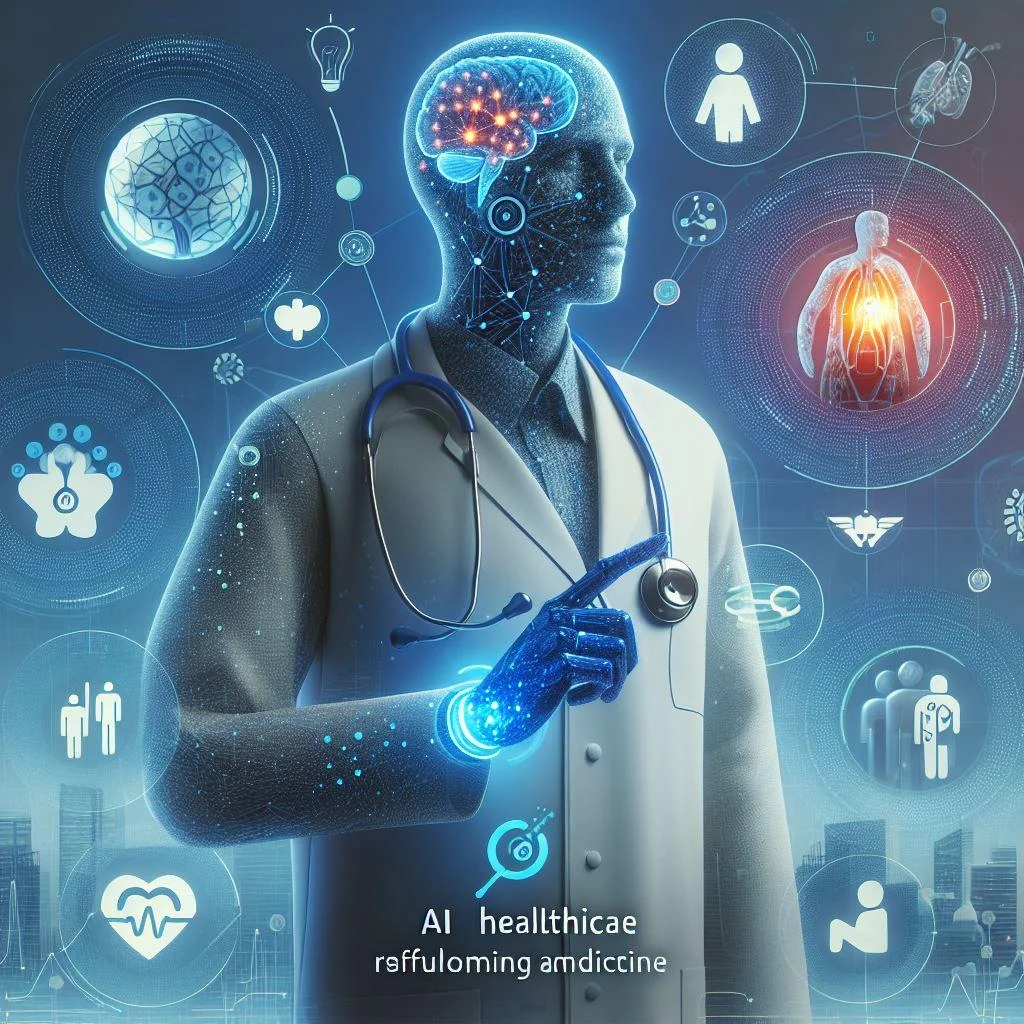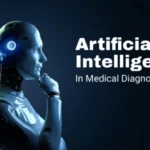Machine learning is radically changing the health industry with algorithms that anticipate heart attacks, surgery robots, and chatbots capable of diagnosing depression. Artificial intelligence promises to reduce costs, save lives, and improve access to care. However, as AI technology extends its roots further into the world, several critical questions arise: Can we trust AI with our health? And who is answerable when AI makes a blunder? We will look at these fundamental questions and dilemmas of ethics defining AI’s impact on the contemporary medical world.
The AI Healthcare Revolution: What is Currently Happening?

AI is not sci-fi anymore, it’s already in the hospitals, labs, and even in smartphones. Here is how it is changing care today:
- The Use of AI Tools in Medical Diagnostics: Faster, Smarter, Better
- Medical imaging: AI tools like Google’s DeepMind analyze X-Rays, MRIs, and CT scans for tumors, fractures, or strokes, rivaling the accuracy of radiologists.
- Pathology: Algorithms are scanning tissue samples for cancer cells in biopsy samples.
- Early detection: Startups like Paige.AI are flagging early signs of breast cancer up to two years before symptoms by using AI.
- The Use of AI In Genomic Medicine: Personalized Medicine, Modification of Treatment According to DNA. AI helps oncologists predict responses to drugs by decoding genetic data and tailoring chemotherapy regimens.
Wearable Technology: Smart devices such as the Apple Watch use AI to track users’ heart rhythm, warning them of possible atrial fibrillation or sleep apnea.
- Drug Development: From the Lab into The Market in Record Time DeepMind’s AI, AlphaFold, forecasts protein structures, paving the way for accelerated vaccine and drug development. Like Insilico Medicine, other startups leverage AI for rapid molecule design aimed at conditions such as ALS, reducing research duration from years to months.
- Administrative Efficiency:
- Reducing Expenses and Easing Burnout Voice recognition technology: AI transcribes doctor-patient interactions, resulting in less paperwork. Predictive analytics: Hospitals are beginning to use AI to predict bed shortages, as well as staff shortages, and even ER wait times.
- The Promise: How AI Can Save Hundreds Of Millions Of Lives Early intervention: Monitoring systems based on AI are now able to predict issues such as diabetic retinopathy, sepsis, or even mental health crises and intervene before matters escalate.
- Global equality: Symptom-checking applications such as Ada are enabling low-resource regions without adequate access to equipped medical professionals.
- Cost reduction: By 2026, McKinsey estimates AI within the healthcare sector will save the U.S. over 150 billion dollars, streamlining spending.
The Pitfalls and Risks: Ethical Slalom We Can’t Circumvent For every upside
AI implementation into healthcare comes with numerous setbacks.

- Bias In Algorithms Perceived brutality: An algorithm used in hospitals across the United States to prioritize patient care for a queue in 2019 was revealed to favor white patients over sicker black patients. AI models built and trained on western data tend to ignore older and non-white patients due to widely held stereotypes, AI is so popular nowadays that many people expect an instant translation.
- The Threat to Privacy Data Security Data breaches: Hackers look to steal Health Records Content because it is like gold to them. A ransomware attack on a French Hospital in 2023 crippled the AI-powered systems that provided critical care. Surveillance fears: Is it possible that employers or insurers could use AI predictions unethically to deny jobs and coverages?
- The Human Touch: Eroding Trust Over-dependance: There is a risk that a physician may rely on an AI made diagnosis and not make the appropriate changes. This is termed “automation bias.” Depersonalization: Assume that a person has a machine created diagnosis. Will the person accept it?
- Legal Gray Areas Who bears the consequences? If a physician AI misdiagnoses a patient. Is it the doctor, the developer of the software or the institution that gets blamed? FDA’s dilemma: While the agency has given the green light to 523 AI medical tools (as of 2023) critics say the power rests in slowing progress.
Real World Case Studies:
- The Wins and Cautionary Tales of AI Success: In South Korea, maternal deaths were decreased by twenty percent after nurses in remote locations began using AI-powered ultrasound equipment to identify high-risk pregnancies.
- Controversy: In 2022, Watson for Oncology by IBM was abandoned after it was found to give unsafe treatment recommendations due to issues in its training data.
The Future of AI in Healthcare: Where else are we headed?

- Are AI Doctors A Reality? Companies like Babylon Health already offer AI controlled teleconsultations, although supervision is still needed.
- Mental Health: Woebot and other apps use chatbots powered by AI to give cognitive behavioral therapy as a way to help close the gaps.
- Climate Resilience: AI models predict disease outbreaks associated with global warming, including projecting malaria epidemics after flooding.
FAQs: Distilling Excitement from Facts
Q: Is it possible for AI to take the role of a doctor?
A: No. AI tools can analyze data but are devoid of compassion, morals, and contextual sense. It’s more of a handy tool than a transformation.
Q: How secure is my health data concerning the AI systems?
A: There is some level of risk. Data from reputable providers is usually encrypted, but privacy terms should always be checked and data sharing avoided if possible.
Q: Does AI technology guarantee better prices on healthcare?
A: It can, but only if the systems focus on making money rather than providing health for profit. Without regulation in place, expenses may actually increase.
Navigating the AI Crossroads: A Call for Balance
AI in healthcare is not good or bad. It stands as a reflection of our needs. To make effective use of AI’s potential, we must take the following steps:
- Seek accountability: Knowing when AI is in control of patient care is crucial.
- Combat bias: Discrimination in algorithms and training data need to be dealt with.
- Safeguard the weak: AI should not aggravate the gap within disenfranchised societies.
Simply put, AI has the potential to reduce the controlling margin around empowerment and eliminate diseases while extending life expediencies, however, without the ethical framework, it will become a tool of discrimination. In the complete revolution of technology powered medicine, attention needs to be on ethics.
Your Role in the AI Era:
- Make sure you understand the AI tools which are utilized in your treatment.
- Lead the development of policies that center on equity and responsibility.
- Endorse the AI Now Institute and Partnership on AI for their ethics audits of Artificial Intelligence
ALSO READ MORE HEALTH ARTICLES FROM CHIID HEALTH



